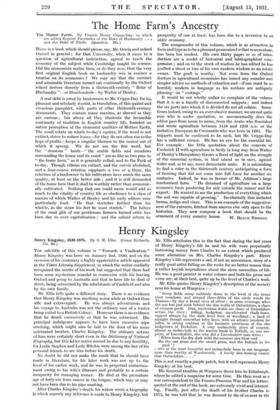The Home Farm's Ancestry The Manor Farm. By Francis Henry
Cripps-Day, to which are added Reprint Facsimiles of the Boke of Husbandry . . . and the Boke of Thrift. (Quaritch. 36s.) HERE is a book which should please, say, Mr. Orwin and indeed Oxford in general ; for that University, when it came to a question of agricultural instruction, agreed to teach the economy of the subject while Cambridge taught its science. Did the economists realise then, or do they now, that the very first original English book on husbandry was in essence a treatise on its economics ? We may say that the succinct and admirable literature turned out continually by the Oxford school derives directly from a thirteenth-century "Boke of Husbandry "—or Hosebonderie—by Walter of Henley.
A real debt is owed by landowners to Mr. Cripps-Day for his pleasant and scholarly reprint, in translation, of this quaint and vivacious pamphlet, with parts of other thirteenth-century documents. They contain many maxims, as shrewd as they are curious ; but above all they illustrate the invincible continuity of tradition in English country life, founded on native perception of the elemental qualities of Mother Earth. The small estate on which to-day's squires, if the word is not extinct, strive to reduce losses—for they do not often rise to the hope of profits—keeps a singular likeness to the manor out of which it sprang. We do not use the fine word, but the " demesne " lands—" the arable fields and meadows surrounding the house and its court" are as like as two pins to "the home farm," as it is generally called, and to the Park of to-day. Though villeins are extinct, and the cox-v.& abolished, and a four-course rotation supplants a two or a three, the relations of a landowner to his cultivators have much the same quality, at least on the better side ; and it is still demanded of the home farm that it shall be worthily rather than economic- ally cultivated. Nothing that one could name would add so much to the vitality of country life as obedience to a class of maxim of which Walter of Henley and his early editors were particularly fond. "He that stretches further than his whittle, in the straw his feet he must stretch." The failure of the most glib of our gentleman farmers turned critic has been due to over capitalization ; and the salient return to prosperity of one at least, has been due to a reversion to an older economy.
The compounder of this volume, which is so attractive in form and type as to be a pleasant possession for that reason alone, has been too modest. His own thirty pages or so of intro- duction are a model of historical and bibliographical com- pression; and on to the stock of wisdom he has edited he has grafted a shoot or two of his own modern wisdom as an estate owner. The graft is worthy. Not even from the Oxford doctors in agricultural economics has issued any sounder and simpler advice on methods of valuation and—if one must be as horribly modem in language as his authors are antiquely pleasing—in "coatings."
It would be not wholly unfair to complain of the volume that it is as a bundle of disconnected snippets ; and indeed the six parts into which it is divided do not all cohere. Some- times indeed, owing to an over-elusive manner, we are not quite sure who is under quotation, so unconcernedly does the editor pass from name to name, from the Arabs who flourished and wrote agriculture between 1158 and 1200 A.D. or the imitative European de Crescentiis who was born in 1235. The snippets must be confessed to be such, but Mr. Cripps-Day has a sufficient excuse. He has an eye for the essential bit. For example : the little quotation about the concern of Frederick II with agriculture in Sicily (a long way from Walter of Henley's Hampshire) throws a flood of light on the struggle of the manorial system, in that island as in ours, against wider and, so to say, more democratic units. It is astonishing to find a ruler in the thirteenth century anticipating a form of farming that did not come into full force for another six centuries. Indeed, he was in favour of Mr. Addison's large mechanized farm. "He dreamed of agriculture on a large economic basis producing for sale outside the manor and for export. He wanted to see the production of everything which the soil was capable of growing." Incidentally this included henna, indigo and vines. This is an example of the suggestive- ness of the extracts, fetched from sources else only open to the historian. They now compose a book that should be the
ornament of every country house. W. BEACH THOMAS.






























 Previous page
Previous page